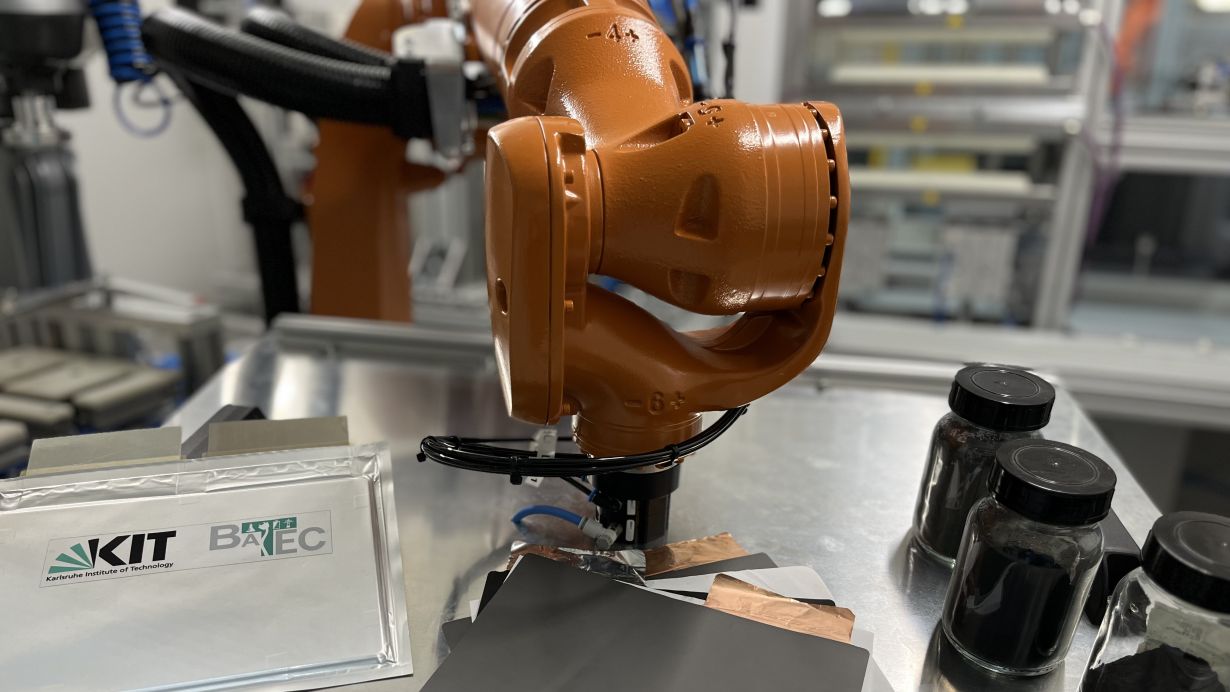The market for electric cars is growing rapidly and so does the need for lithium-ion batteries. Their recycling is an important part of the production cycle. Current methods are based on the decomposition of active battery materials into their molecular constituents, which is associated with a high consumption of energy and chemicals. Researchers of Karlsruhe Institute of Technology (KIT) and industry partners have now launched a collaboration to develop a more efficient recycling process for spent batteries, by means of which the active components are recovered while maintaining their functionality. The project is funded by the Federal Research Ministry with approximately EUR 3 million.
Electrification of the mobility sector is needed for Germany to reach its climate protection goals. Hence, it represents a megatrend in Germany’s automotive industry. “The associated high need for lithium-ion batteries requires sustainable and closed material cycles, from battery materials throughout the battery lifecycle to recycling as well as a closed cycle of battery cell manufacture,” says Dr. Marco Gleiß from the Institute for Mechanical Process Engineering and Mechanics. Gleiß is KIT’s coordinator of the project “Agile Process Chain for Direct Recycling of Lithium-ion Batteries and Regeneration of Active Materials” (DiRecReg). ”By closing the chain of added value, we can reduce Germany’s and the European Union’s dependence on raw materials,” Gleiß adds.
Recovering Rather Than Crushing or Decomposing
By means of current methods, battery cells are crushed and active materials are dissolved down to the molecular level for later extraction from the liquid in the form of metal salts. In this way, up to 90 percent of critical elements, such as cobalt, nickel, and manganese, can be recovered. However, consumption of energy and chemicals is very high. And even more energy and raw materials are required for the production of new battery material from the materials extracted. New, highly promising approaches, by contrast, are based on the direct recycling of active materials from spent batteries or production waste. “The active materials are no longer dissolved completely. Instead, they are decomposed into their constituents and separated mechanically so that highly pure fractions can be recovered,” Gleiß explains.
Active Recovery of Battery Materials Is Still in Its Infancy
Such a direct recycling process is not yet used in industry, as the behavior of the recycled material cannot be predicted. Criteria and rules to assess the usability of the aged material are still lacking and so are economically efficient solutions to decompose different battery packs into their constituents with a reasonable expenditure. “These aspects are addressed by our project. It primarily covers the development of an agile process chain for the direct recycling of lithium-ion batteries and regeneration of the recovered active materials,” says project coordinator Dr. Thomas Dreyer from Weber Ultrasonics AG. He points out that it is important that the process can be adjusted to various starting materials of battery production as well as to production waste and can be used to recycle various battery types and designs. “We also want to replace the energy-consuming steps of today’s recycling processes, the objective being to obtain sustainable recyclates of a high quality,” Gleiß adds.
Collaborative Project of Four Research and Seven Industry Partners Is Funded with EUR 3 Million
The DiRecReg project is scheduled for a duration of three years and funded with EUR 2.95 million by the Federal Research Ministry. The project consortium under the direction of Weber Ultrasonics AG consists of ten partners and one associated partner. Among them are four institutes of KIT: wbk Institute of Production Science, the Institute for Mechanical Process Engineering and Mechanics, the Institute of Applied Geosciences with the Chair for Geochemistry and Economics Geology, and the Thin-Film Technology Working Group. The six industry partners are: Battery cell manufacturer PowerCo SE, the materials technology and recycling group Umicore AG & Co. KG, the manufacturer of gripping and handling systems SCHUNK SE & Co. KG, plant integrator FIBRO LÄPPLE TECHNOLOGY GMBH, and plant manufacturers Carl Padberg Zentrifugenbau GmbH and Weber Ultrasonics AG. Siemens supports the project in the area of control and digitalization systems as an associated partner.
Further Information: https://www.mvm.kit.edu/english/index.php
More about the KIT Center Materials in Technical and Life Sciences
In close partnership with society, KIT develops solutions for urgent challenges – from climate change, energy transition and sustainable use of natural resources to artificial intelligence, sovereignty and an aging population. As The University in the Helmholtz Association, KIT unites scientific excellence from insight to application-driven research under one roof – and is thus in a unique position to drive this transformation. As a University of Excellence, KIT offers its more than 10,000 employees and 22,800 students outstanding opportunities to shape a sustainable and resilient future. KIT – Science for Impact.

